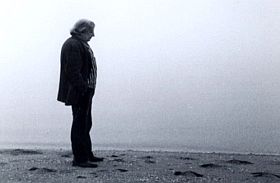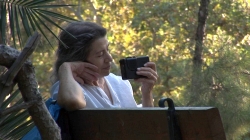


Torben Skjødt Jensen: Teaterdokumentarer /4
22. juli 2013 havde Torben Skjødt Jensen denne underdrevent stolte opdatering på sin Facebookside om sin tv-udgave af Christian Lollikes modige teaterstykke om Anders Breivik og hans i al fremtid ufattelige forbrydelse: ”Husk det nu – iaften 20.45 DR2 – MANIFEST 2083, teaterforestillingen fra CafeTeatret af Christian Lollike og med Olaf Højgaard, produceret og klippet af mig (sagde hunden) i en special version for netop DR – og vi har alle “oppet” os det bedste vi har lært…” Jeg så ikke tv-versionen dengang, først nu, og det er et fortsat chok (nu efter igen en pause) at se Torben Skjødt Jensens overførsler af teaterforestillinger til film, den ene lykkes bedre end den anden.
Hans tv-version af ”Manifest 2083” er rystende vellykket. Hele filmen handler om forestillingen, som udelukkende handler om at lave den teaterforestilling. På den måde bliver Olaf Høigaard ved med at være sig selv og aldrig den forbryder, hvis grusomme forbrydelse er baggrund for ønsket om og viljen til at lave den teaterforestilling og dernæst denne film.
Han påtager sig gennemført på alle planer det mimesiske skuespillerarbejde. Han styrketræner, indtager steroider, foretager japansk meditation. Jeg ser det hele, han sminker sig til forestillingen. Morderen sminker sig. ”Jeg skabte et narrativ”, sagde morderen. Det samme kan Lollike og Højgaard og Skjødt Jensen på den diametralt modsatte menneskelige og etiske baggrund herefter sige. De etablerede den skræmmende fortælling om, at det er muligt. Når som helst, hvor som helst. Morderne går omkring iblandt os.
Torben Skjødt Jensen har sat sit markante præg på Christian Lollikes og Olaf Høigaards modige teaterstykke. Skjødt Jensens aftryk er denne særlige berøring med en sikker, hurtig pensel, noget ubestemt tydeligt, som ikke kan være anderledes, som jeg kender fra hans film langt tilbage, som vist altid har været der i hans værk. Og ja, han har med Lollike og Højgaard oppet sig, og det var egentlig ikke påfaldende nødvendigt.
”Manifest 2083”, Danmark, 80 min. Postedified TV & Film, København. Det grundlæggende teaterstykke havde premiere 15. oktober 2012 på Café Teatret. Sendt på DR 2 første gang 22. juli 2013 og i forbindelse med teaterfestivalen på DR K for kort tid siden. Vil formodentlig blive genudsendt der, da de formodentlig har rettighederne til flere visninger.

